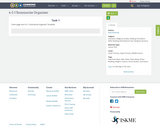
- Subject:
- Literature
- Reading Foundation Skills
- Reading Informational Text
- Reading Literature
- Religious Studies
- Material Type:
- Lesson Plan
- Author:
- Kelly Shivinsky
- Date Added:
- 05/22/2019


An exploration of practical research issues for social scientists
Long Description:
Indigenous Data Sovereignty Workshop
Word Count: 14493
(Note: This resource's metadata has been created automatically by reformatting and/or combining the information that the author initially provided as part of a bulk import process.)

Practical applications for social scientists
Long Description:
Practical applications for social scientists
Word Count: 7124
(Note: This resource's metadata has been created automatically by reformatting and/or combining the information that the author initially provided as part of a bulk import process.)
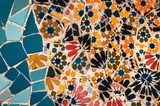
In this class, we will explore America's diversity through questions of immigration, race, gender/sexuality and class--some of the major ways our culture is organized. It is comprised of 9 lessons based on online resources, plus 2 auto-ethnography assignments. This class was originally taught by Huma Mohibullah at Renton Technical College.

Religion is a significant aspect of human cultures everywhere. In these lessons, we explore questions such as: What are the main elements of religion? Why is believing in a higher power important to human beings across cultures? How is religion related to our social orders? How is religion related to the politics of today's world?This resource is comprised of 7 lessons based on online modules, plus a final presentation assignment. Each lesson includes a discussion or written assignment. This class was originally taught by Huma Mohibullah at Renton Technical College.
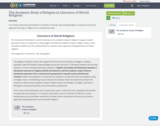
A non-linear interactive presentation for students to discover why studying religino is important and how to approach the study of religion from a nonsectarian view.
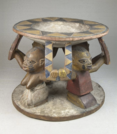
This textbook on Ifa, a traditional African religion, was authored by Dr. Will Coleman of the Interdenominational Theological Center. Help and contributions were given by Awo Fa'lokun Fatunmbi, and Oscar Daniel and Brad Ost of the AUC Robert W. Woodruff Library.
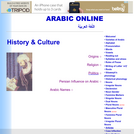
This webpage provides elementary information on aspects of Arab culture and history, including religion, politics, naming conventions, and Persian influence on Arab culture and language. The information seems to have been authored by the site's administrator, and contains no references or citations.
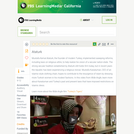
This Wide Angle video segment illustrates Islamic and secular elements of life in Turkey, and introduces Mustafa Kemal Ataturk, the first president of Turkey, and his reforms.
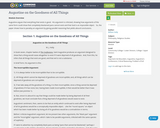
Augustine argues that everything that exists is good. His argument is criticized, showing how arguments of the same form could show that completely blackened pans cannot exist and that God is an impossible object. So, the paper shows how to paradoy an argument by giving parallel reasoning that yields absurd conclusions.

This course is an introduction to major books from both the Hebrew Bible and the New Testament. Particular attention has been given to literary techniques, issues resulting from translation from the original Hebrew and Greek, and the different historical periods that produced and are reflected in the Bible. Investigation of the Bible as influence in later narrative, philosophic, and artistic traditions.
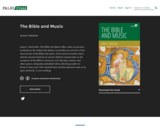
The Bible and Music by Dr. James F. McGrath provides an introduction and overview of the various ways that music and the Bible have been and continue to be connected. Part 1 focuses on history, presenting what we know about how music in the Ancient Near East sounded, how markings in the Masoretic Text of the Hebrew Bible have been interpreted as musical symbols, how chanting of biblical texts has featured liturgically in synagogues and churches, the impact of the Protestant Reformation, and musical developments in North America as enslaved Africans encountered biblical texts and stories. Part 2 focuses on specific texts in Jewish and Christian scripture and looks at how they have been interpreted through the process of setting them to music, including the soundtracks of cinematic depictions of biblical narrative and allusions to the Bible in popular music. Part 3 focuses on composers from the Middle Ages all the way down to the present day. Throughout the book, musical examples are not merely mentioned but embedded so that reading and listening may be seamlessly combined. The book does not presume prior knowledge of either music or the Bible, and additional links within the text provide definitions and further explanations for those who need or desire them.
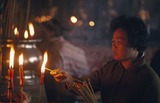
Buddhism is one of the world’s largest religions and originated 2,500 years ago in India. Buddhists believe that the human life is one of suffering, and that meditation, spiritual and physical labor, and good behavior are the ways to achieve enlightenment, or nirvana.
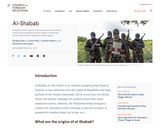
The Council on Foreign Relations (CFR) presents a backgrounder on Al-Shabab; an Islamist insurgent group that remains capable of carrying out massive attacks in Somalia and surrounding countries despite a decade-long African Union offensive against the Islamist group. CFR Backgrounders provide an in-depth analysis on current political and economic issues.
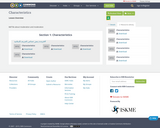
Bdf file about moderation and moderation

Une anthologie de L’Entraide missionnaire
Short Description:
CETTE ANTHOLOGIE PRESENTE 60 TEXTES CLASSES CHRONOLOGIQUEMENT REFLETANT DES PREOCCUPATIONS SOCIALES, POLITIQUES ET SPIRITUELLES EN EVOLUTION. CES TEXTES SONT MAJORITAIREMENT DES CONFERENCES QUI ONT ETE PRONONCEES LORS DU CONGRES ANNUEL DE L’ENTRAIDE MISSIONNAIRE JUSQU'EN 2015, OFFRANT UN ECHANTILLON DES TRESORS QUI SE TROUVENT DANS SES ARCHIVES.
Long Description:
Incorporé en 1958, L’Entraide missionnaire a réalisé un parcours remarquable au service de la solidarité internationale grâce à l’engagement soutenu de ses membres, des personnes responsables de la permanence et un grand nombre de collaboratrices et collaborateurs à travers le monde. En 2015, suite à une lecture collective des signes des temps, les membres de L’Entraide missionnaire ont pris la décision d’entamer un processus de transmission d’héritage avant de fermer l’organisme au printemps 2018.
En offrant un échantillon, certes très limité, des trésors qui se trouvent dans les archives de L’Entraide missionnaire, cette anthologie présente 60 textes classés chronologiquement reflétant des préoccupations sociales, politiques et spirituelles en évolution. L’essentiel de ces textes sont des conférences qui ont été prononcées lors du Congrès annuel de l’Entraide missionnaire, véritable lieu de rassemblement, d’échanges, de réflexions et de critiques sociales.
À la lumière de l’introduction et à travers les lectures sélectionnées, on découvre, même dans les textes écrits sur du vieux papier, des archives qui sont toujours en conversation avec le présent, attentives aux signes des temps. Nous y découvrons des brèches de résistance et d’affirmation de vie et d’humanité solidaire contre les obstacles qui nous confrontent. Nous y trouvons une continuité jusqu’au dernier geste de transmission du legs : un engagement profond et réfléchi qui exige de l’audace, de l’indignation face à l’injustice et de l’espérance pour la transformation du monde.
Word Count: 265162
(Note: This resource's metadata has been created automatically by reformatting and/or combining the information that the author initially provided as part of a bulk import process.)
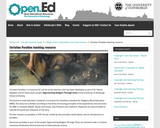
Christian Parables is a resource for use by school teachers that has been developed as part of Dr Naomi Appleton and Dr Alison Jack’s project Approaching Religion Through Story at the University of Edinburgh School of Divinity.
Structured to meet Education Scotland’s Curriculum for Excellence standard for Religious Moral Education (RME), the resource is divided according to the three structuring principles of the experiences and outcomes for RME in Scotland: Beliefs, Values and Issues, and Practices and Traditions. Keywords are also provided to indicate the particular relevance of the story.
The file contains six parables in PDF format, sorted by the principles stated above, and an introduction to parables.
Resources provided as part of the project ‘Approaching Religion Through Story’ are licensed under a Creative Commons Attribution-NonCommercial 4.0 International Licence.
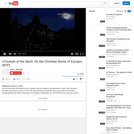
For the most part recorded on site in places such as Subiaco, Montecassino, Assis, San Casciano, Florence and Rome in June of 2013, the documentary we present here was produced and then broadcasted by the State Television of Portugal on December 24, 2013 (RTP2) and January 2, 2014 (RTP1). The Program was produced for RTP1 by the Journalist Fátima Campos Ferreira and the Reporter of Image Carlos Oliveira under the scientific advice of João J. Vila-Chã, professor for Philosophy at the Pontifical Gregorian University in Rome. The documentary was particularly enriched by the contribution of Professor Joseph Weiler, President of the European University Institute in Florence, and was edited by Alexandre Leandro, chief-editor at the RTP. Originally titled (in Portuguese) «O Triunfo do Espírito», the documentary was conceived as (a rather unusual form of) narrative about (the Idea of) Europe and out of the recognition that for the present as for the future of the world a confront remains unavoidable with the cultural and the religious dimension of the Idea of Europe as we know it through the media of our cultural (and philosophical) history. We are grateful to all the Institutions that in places such as Subiaco, Montecassino, Assis, Florence, San Casciano and Rome allowed the team sent by the RTP to Italy to realize the work as intended and so contributed in a decisive way to this particular (and somehow peculiar) narrative about the Idea of Europe.
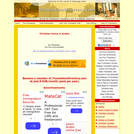
This site offers a brief list of words that relate to Christianity, including a number of terms that are specific to Christianity as it is practiced in the Middle East. Many of the words are accompanied by brief explanations of their significance. The glossary is preceded by a brief introduction.

Step-by-Step instructions for collaboratively annotating a public-domain text in your course and sharing it with the world.